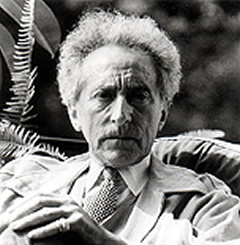
|
Filmmakers
|
 |
|
|
 JEAN COCTEAU
JEAN COCTEAU
Born on July 5, 1889, Jean Cocteau was certainly one of the most eclectic French literary figures of the first half of the twentieth century. While he thought of himself primarily as a poet, he was also a novelist, playwright, artist, and librettist, as well as a screenwriter, actor, and filmmaker. In the first decades of the century he was one of the most fashionable figures in the Parisian salons, and the interwar period saw intense artistic creativity on his part. He distinguished himself in the theater with The Eiffel Tower Wedding Party (1924), The Human Voice (1930), La Machine infernale (1934), Les Parents terribles (1938), Les Monstres sacrés (1940), The Typewriter (1941), The Eagle Has Two Heads (1946), and Bacchus (1952).
In 1930 Cocteau made his first film, The Blood of a Poet, which bears the mark of the still popular Surrealist movement and the experimental spirit which that implies. The film is striking also by its autobiographical character. The few films directed by Cocteau himself — with the possible exception of his second work, Beauty and the Beast — are all part of a sort of diary in which he expressed his personal obsessions and his reflections on his art, as well as on the role of the poet. He considered cinema to be one of the means by which he could express “the unknown character which lives within him” and stated that “the role of the poet is to turn his thoughts into acts. Just imagine what good a film can do us, if it helps us express intimate things.” He wrote his own screenplays and dialogues for all of the films he directed. These included The Eagle Has Two Heads (1947), the adaptation of his romantic boulevard drama Les Parents terribles (1948), Orphée (1950), and Le Testament d’Orphée (1960). As the last two films demonstrate, Cocteau was strongly attracted by stories from Antiquity, which he attempted to make universal through anachronism or simply by modernization. Beauty and the Beast, on the other hand, is an adaptation, in period costumes, of a fairytale by Mme Leprince de Beaumont (1757).
In addition to the films directed by Cocteau himself, he wrote numerous film adaptations and dialogues, including for one of his own plays, The Human Voice (Roberto Rossellini, 1948) and two of his novels, Les Enfants terribles (Jean-Pierre Melville, 1956) and Thomas l’imposteur (Georges Franju, 1965). Films for which he merely wrote the screenplays or dialogues include a modernized version of the Tristan and Isolde myth, The Eternal Return (Jean Delannoy, 1943), the modernized adaptation of an episode from Denis Diderot’s 1770 novel Jacques the Fatalist and His Master, The Ladies of the Park (Robert Bresson, 1945), an adaptation of Victor Hugo’s romantic drama Ruy Blas (Pierre Billon, 1947), The Wedding in the Dunes (André Swoboda, 1948), based on a Moroccan legend, and The Princess de Clèves (Jean Dalannoy, 1961), adapted from the classical novel by Mme de Lafayette.
In 1955 Cocteau was elected to the French Academy, then in 1960 named the “Prince of Poets.” He fell ill and died on October 11, 1963.
Selected Filmography
1930 Blood of a Poet
1946 Beauty and the Beast
1947 The Eagle Has Two Heads
1948 Les Parents terribles
1950 Orphée
1960 Le Testament d’Orphée